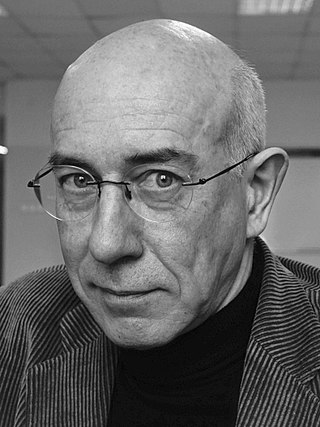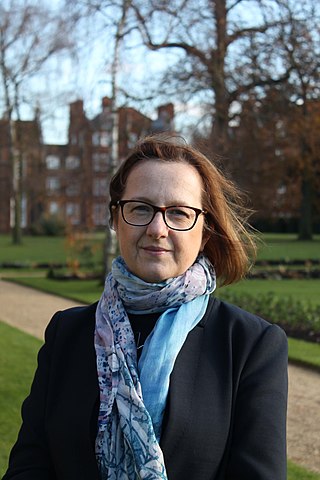Related Research Articles
Theoretical linguistics is a term in linguistics which, like the related term general linguistics, can be understood in different ways. Both can be taken as a reference to theory of language, or the branch of linguistics which inquires into the nature of language and seeks to answer fundamental questions as to what language is, or what the common ground of all languages is. The goal of theoretical linguistics can also be the construction of a general theoretical framework for the description of language.
In English, the word like has a very flexible range of uses, ranging from conventional to non-standard. It can be used as a noun, verb, adverb, adjective, preposition, particle, conjunction, hedge, filler, quotative, and semi-suffix.

Dirk Geeraerts is a Belgian linguist. He is professor emeritus of theoretical linguistics at the University of Leuven, Belgium. He is the founder of the research unit Quantitative Lexicology and Variational Linguistics (QLVL). His main research interests involve the overlapping fields of lexical semantics, lexicology, and lexicography, with a theoretical focus on cognitive semantics. His involvement with cognitive linguistics dates from the 1980s, when in his PhD thesis he was one of the first in Europe to explore the possibilities of a prototype-theoretical model of categorization. As the founder of the journal Cognitive Linguistics and as the editor of the Oxford Handbook of Cognitive Linguistics, he played an instrumental role in the international expansion of cognitive linguistics. Geeraerts is one of the outspoken advocates of the implementation of empirical methodologies, such as corpus linguistics in cognitive linguistic research. He also argues for the involvement of more pragmatic elements such as contextual factors, lectal variation, and language history that influence the construal of word meanings and the choice of lexical items for concepts.
A discourse marker is a word or a phrase that plays a role in managing the flow and structure of discourse. Since their main function is at the level of discourse rather than at the level of utterances or sentences, discourse markers are relatively syntax-independent and usually do not change the truth conditional meaning of the sentence. They can also indicate what a speaker is doing on a variety of different planes. Examples of discourse markers include the particles oh, well, now, then, you know, and I mean, and the discourse connectives so, because, and, but, and or. The term discourse marker was popularized by Deborah Schiffrin in her 1987 book Discourse Markers.
Historical pragmatics is the study of linguistic pragmatics over time. Research in historical pragmatics is mainly carried out on written corpora as recordings of spoken language are a relatively recent phenomenon.
In pragmatics, scalar implicature, or quantity implicature, is an implicature that attributes an implicit meaning beyond the explicit or literal meaning of an utterance, and which suggests that the utterer had a reason for not using a more informative or stronger term on the same scale. The choice of the weaker characterization suggests that, as far as the speaker knows, none of the stronger characterizations in the scale holds. This is commonly seen in the use of 'some' to suggest the meaning 'not all', even though 'some' is logically consistent with 'all'. If Bill says 'I have some of my money in cash', this utterance suggests to a hearer that Bill does not have all his money in cash.
Linguistics is the scientific study of language. Linguistics is based on a theoretical as well as a descriptive study of language and is also interlinked with the applied fields of language studies and language learning, which entails the study of specific languages. Before the 20th century, linguistics evolved in conjunction with literary study and did not exclusively employ scientific methods.

Jespersen's Cycle is a series of processes in historical linguistics, which describe the historical development of the expression of negation in a variety of languages, from a simple pre-verbal marker of negation, through a discontinuous marker and in some cases through subsequent loss of the original pre-verbal marker. The pattern was formulated in Otto Jespersen's 1917 book Negation in English and Other Languages, and named after him in Swedish linguist Östen Dahl's 1979 article Typology of Sentence Negation.

Katarzyna Malgorzata "Kasia" Jaszczolt is a Polish and British linguist and philosopher. She is currently Professor of Linguistics and Philosophy of Language at the University of Cambridge, and Professorial Fellow at Newnham College, Cambridge.
Laurel J. Brinton is an American-born Canadian linguist.
Georgia M. Green is an American linguist and academic. She is an emeritus professor at the University of Illinois at Urbana-Champaign. Her research has focused on pragmatics, speaker intention, word order and meaning. She has been an advisory editor for several linguistics journals or publishers and she serves on the usage committee for the American Heritage Dictionary.

C.T. James Huang is a Taiwanese-American linguist. He is a professor of linguistics at Harvard University.
David W. E. Willis, is a linguist and Celticist. In 2020 he took up the post of Jesus Professor of Celtic at the University of Oxford. He had previously held posts in historical linguistics at the University of Manchester and at the University of Cambridge, where he was a Fellow of Selwyn College.
Ekkehard König is a German linguist and Professor Emeritus at the Free University of Berlin, specializing in linguistic typology, semantics, and the linguistics of English.
Mira Ariel is a professor of linguistics at Tel Aviv University, specializing in pragmatics. A pioneer of the study of information structure, she is best known for creating and developing Accessibility Theory.

Carita Paradis is a Swedish linguist, and Professor of English Language and Linguistics at Lund University.
Christiane Marchello-Nizia is a French linguist who specializes in the history of the French language. She was professor at the École normale supérieure de Lyon and Director of the Institute for French Linguistics until her retirement in 2006.

Isabelle Bril is a senior researcher at the French National Centre for Scientific Research and a member of LACITO specializing in morphosyntax, semantics, typology, and Austronesian languages.
Louise McNally is a linguist and professor in the Department of Translation and Language Sciences at Universitat Pompeu Fabra (UPF). She researches semantics and pragmatics and their interfaces with syntax, in particular on areas including natural semantic ontology, scales, and reference.
Ashwini Deo is a linguist who specializes in semantics, pragmatics, and language variation and change, with an empirical focus on the Indo-Aryan languages. She is currently Professor of Linguistics at the University of Texas at Austin.
References
- 1 2 3 "University of Manchester: Professor Maj-Britt Mosegaard Hansen" . Retrieved 2 April 2022.
- 1 2 "Academia Europaea: Hansen Maj-Britt Mosegaard" . Retrieved 2 April 2022.
- ↑ "Academia Europaea: Hansen Maj-Britt Mosegaard: CV" . Retrieved 2 April 2022.
- ↑ "Royal Academy: Professor Maj-Britt Mosegaard Hansen" . Retrieved 2 April 2022.
- ↑ "University of Manchester: Professor Maj-Britt Mosegaard Hansen: Research and projects" . Retrieved 2 April 2022.
- ↑ "Studies in Pragmatics" . Retrieved 2 April 2022.
- ↑ "GtR: The role of pragmatics in cyclic language change" . Retrieved 2 April 2022.